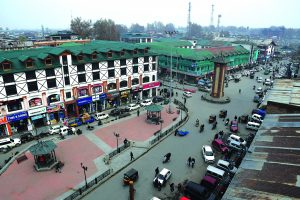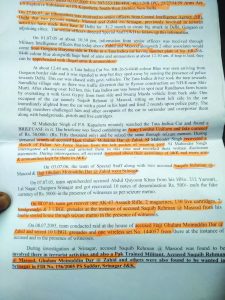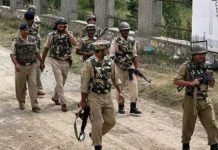 The National Investigation Agency (NIA) is investigating how Pakistan’s spy agency Inter-Service Intelligence (ISI) used honey traps and money power to lure Indian officials in its trap. The case of J&K Police DSP Davinder Singh who has been booked on January 11, 2020 under the Arms Act and the Unlawful Activities (Prevention) Act (UAPA) confirms how ISI used women and money to involve Indian officials in unlawful activities.
The National Investigation Agency (NIA) is investigating how Pakistan’s spy agency Inter-Service Intelligence (ISI) used honey traps and money power to lure Indian officials in its trap. The case of J&K Police DSP Davinder Singh who has been booked on January 11, 2020 under the Arms Act and the Unlawful Activities (Prevention) Act (UAPA) confirms how ISI used women and money to involve Indian officials in unlawful activities.
It may be recalled that few months back too Indian Intelligence agencies had busted a call centre run by ISI to target police, paramilitary other senior officials. The call centre used Indian SIM cards mostly in the name of Indian women. Using such Indian sim cards, fake IDs were created on Facebook in the name of Indian women. The actual identities were Pakistani women who through honey trap befriended Indian officials for secret information. Where honey trapped failed, money traps were used.
The arrested officer has claimed that he was carrying out an operation. DSP Davinder Singh was posted in the anti-hijacking unit positioned in the Srinagar Airport and therefore could not have been engaged in covert counterterror operations.
The arrested DSP was caught in south Kashmir while ferrying two militants to Jammu on January 11. Davinder Singh was alleged to have been ferrying the militants from the Shopian area, possibly out of the Valley. Now another case has been registered against Davinder Singh. After re-registering the case involving arrest of J&K Deputy Superintendent of Police Davinder Singh, the NIA is set to probe a letter written by the officer in 2005.
The Intelligence Bureau has found that in the letter, the DSP had asked for “safe passage” to one of the four terrorists arrested by the Delhi Police on the Delhi-Gurugram border on their way from Kashmir to Delhi. Currently the accused had been booked under the Unlawful Activities (Prevention) Act, but as the probe progresses, he could be arrested under the National Security Act. The NIA has taken the possession of a 2005 letter written by Davinder and sent it for forensic investigation.
According to the Intelligence Bureau (IB) following the arrest of the four terrorists, search operations were conducted in which the police seized a sketch of the Palam airbase and also a letter written by the DSP to one of the arrested terrorists. The IB said that the letter, signed by Davinder Singh, who was then Deputy Superintendent of Police, CID, in Jammu and Kashmir, said the terrorist was allowed to carry a pistol (registration no. K 14363) and one wireless set for ‘duty’.
The letter written by DSP Davinder Singh on his letter head asked all security agencies to give ‘safe passage’ without any verification. The National Investigation Agency has booked suspended J&K Police DSP Davinder Singh under the Arms Act and the Unlawful Activities (Prevention) Act (UAPA). He was caught in south Kashmir while ferrying two militants to Jammu on January 11. Davinder Singh was alleged to have been ferrying the militants from the Shopian area, possibly out of the Valley. A Case registered under sections 18, 19, 20 and 38, 39 of the UAPA.
The NIA’s initial investigations so far have suggested that it wasn’t the first time Davinder Singh had helped militants move around. Section 38 of the UAPA makes it clear that a person, who associates himself, or professes to be associated, with a terrorist organization with intention to further its activities, commits an offence relating to membership of a terrorist organization. Section 39 in UAPA, which has also been imposed on the disgraced J&K cop, clearly states that a person commits the offence relating to support given to a terrorist organization, who, with intention to further the activity of a terrorist organization, addresses a meeting for the purpose of encouraging support for the terrorist organization or to further its activity.
The NIA’s forensic expert team will seize the AK-47, hand grenades, pistol, and mobile phone that were recovered from DSP Davinder Singh’s car and home. The arrest of deputy superintendent of police Davinder Singh for helping terrorists in Jammu and Kashmir has once again brought to focus what happens when an Indian official is lured by Pakistan’s ISI using honey trap and money. In the past too there have been many cases that former officials had worked for ISI or joined their ranks to further their activities in India. It is learnt that when Article 370 was abrogated, weapons of many police officials were taken away fearing and apprehending that they may abet terror activities or join terror groups supported by Pakistan.
Sources said that the Jammu and Kashmir Police will also now investigate arrested officer Davinder Singh’s links with 2001 Parliament attack convict Afzal Guru. Guru was convicted in the 2001 Parliament attack case and was hanged to death on February 3, 2013. In a letter to the court, Guru had alleged that he was following the instructions of Davinder Singh who was then posted in the crucial Special Operations Group (SOG) of JKP. Guru’s allegations against Davinder Singh, however, did not receive much attention then.
Jammu and Kashmir Police arrested the DSP on January 11 when he was allegedly escorting two terrorists. Police on the national highway in Kulgam district caught them. Along with DSP Davinder Singh, Naveed Babu alias Babar Azam, a resident of Nazneenpora in south Kashmir’s Shopian district, and his associate Asif Ahmad were arrested. Both are wanted Hizbul Mujahideen terrorists. Advocate Irfan Ahmad Mir, who was travelling with them, was arrested as well.
According to Director General Jammu and Kashmir Police, Dilbag Singh, “We have caught him in the company of terrorists, a high-level probe headed by Deputy Inspector General of Police of South Kashmir is underway. The premises of Davinder Singh, the arrested officer, had been searched twice resulting in recoveries”. The JKP has recovered a Russian made AK-47, grenades and a huge amount of ammunition from his house in the posh Indra Nagar in Srinagar.
According to the DGP, “The arrested officer has claimed that he was carrying out an operation. Unfortunately, the evidence gathered is not in his favour.” The arrested officer was posted in the anti-hijacking unit positioned in the Srinagar Airport and therefore could not have been engaged in covert counterterror operations.
DGP Dilbag Singh refusing to divulge details of the findings of the probe, said, “Sources are essential to counterterror operations and they need to be handled and run very carefully as per the procedure. Using sources for personal gains is terrible.” The Jammu and Kashmir Police are also looking at previous cases handled by the DSP Davinder Singh to find out his role in such cases earlier.
letters@tehelka.com













